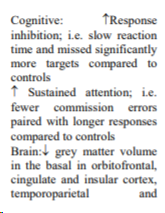Better controlled studies found that cocaine dependent participants had mild cognitive impairment and structural differences; however, this was less than the cognitive impairment of alcohol dependent participants. Structural differences were less than psychopathological disorders such as schizophrenia.
This sounds pretty bad? Especially so because there's other stimulants out there without studies showing they cause cognitive impairment. "Better than being an alcoholic or schizophrenic" is not much of an endorsement.
Here's a longer quote from the article:
Out of the three PET studies summarized in Table 2, two studies not match groups
on age [111,112] and two did not find significant differences between groups on cognitive
measures [110,111]. The clinical importance of both Bolla et al. [111] and Goldstein et al. [112]
remains ambiguous. Both studies found that cocaine abusers exhibited a degree of cognitive
impairment. While Bolla et al. [111] based their conclusions on PET findings, those of Goldstein
et al. [112] were derived from a neuropsychological test battery. The studies also differed in
sample size, number of tasks administered, and use or non-use of demographically adjusted
scores. It is unclear what PET imaging tells us about the neurocognitive functioning of
individuals with cocaine use disorder, given that findings are open to debate and that doubts
persist as to whether metabolic changes in the brain are linked to a specific drug of abuse.
I interpret the authors as saying that it's unclear whether there's any difference at all, much less a "pretty bad" one.
Agreed. Talk about damning with faint praise. Squinting gently at the research, chronic alcohol abuse looks to be worth -5 IQ points, about 1/3 of a standard deviation.
My observation: cocaine turns normal people into arseholes and arseholes into even bigger arseholes.
My conclusion: I would never recommend it to anyone, and certainly never try it again.
Are you sure about the imcreased sustained attention among cocaine users? The abstract in your link seems to suggest the opposite.
I very well could be wrong, but I believe that slower response time indicates less impulsivity, which is "better" sustained attention. Here's how the review article I'm summarizing describes the findings:

Generally, people are biased toward doing what is easy and pleasurable, and making excuses to justify it.
Anecdotally, two programmers who might have occasionally used cocaine ended up quitting their programming jobs to become artists, and have been slowly spending their savings for a few years, working toward making a living through their art (unlikely, they're OK but not that great yet) and thinking the same tier of programming job will be available for them to go back to (doubtful). I strongly suggested that they should both go into AI programming, but they are too normie to listen. So my anecdotal evidence is that the cognitive impact of cocaine is that it makes people make irrational decisions.
This post summarizes The Long-term Effects of Cocaine Use on Cognitive Functioning: A Systematic Critical Review. The punchline is:
This is of interest to me, because cocaine may have short-term benefits as a stimulant, and may have fewer cognitive impacts than alcohol. I am not an expert in this field, and am mostly posting in the hopes that Cunningham’s Law will hold and someone will correct my misunderstandings.
My Summary